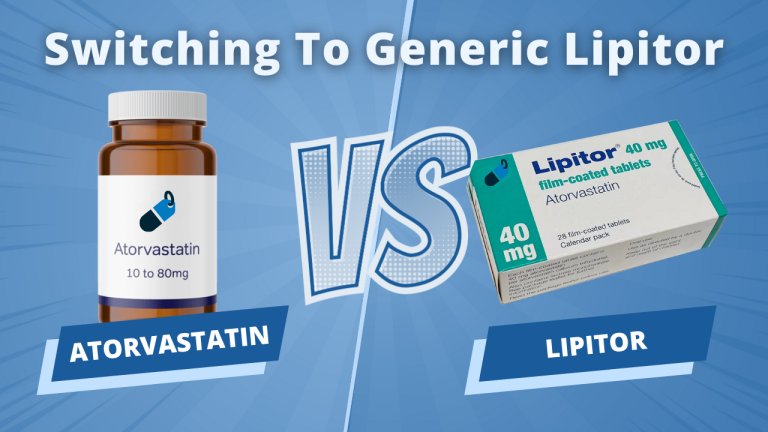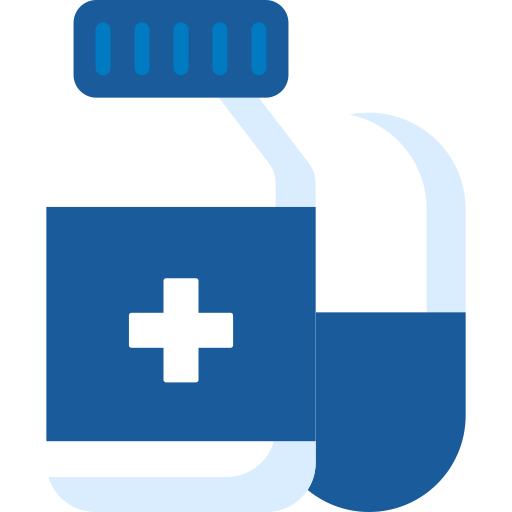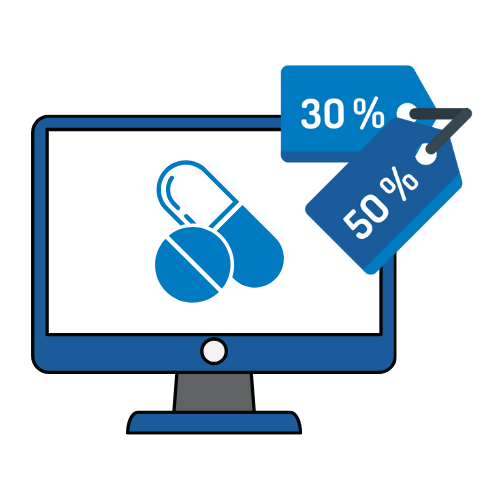Atorvastatin vs Lipitor: Switching To Generic Lipitor
- Last Updated: January 4th, 2024
Key takeaways:
Atorvastatin and Lipitor are the same drug, used to lower bad cholesterol levels.
Studies show both medications work equally well for treating high cholesterol.
Switching from brand - name Lipitor to generic Atorvastatin can save a lot of money.
Both drugs can have side effects like muscle pain and liver damage.
Drinking grapefruit juice while taking these medicines may cause serious problems.
An Overview of Atorvastatin vs Lipitor
On this page, we’ll provide an in-depth comparison of Atorvastatin vs Lipitor, discuss the nuances of these two popular statin drugs, analyze the effectiveness of each drug, and much more.

Intro to Atorvastatin and Lipitor Cholesterol Drugs
Managing cholesterol levels can often feel like a daunting task.
Lipitor, also known as Atorvastatin, is one of the most effective drugs prescribed to combat high LDL cholesterol.
This article provides comprehensive insights comparing the branded Lipitor® and its generic equivalent, Atorvastatin, helping you understand their potency and affordability.
Table of Contents
Comparative Effectiveness of Generic Atorvastatin and Lipitor®
In this section, we’ll discuss the comparative efficacy of Generic Atorvastatin and Lipitor®, highlighting findings from a research conducted by Jackevicius et al, which examined patients hospitalized with acute coronary syndrome.
Study by Jackevicius et al
Jackevicius and his team conducted a comprehensive study to compare the effectiveness of generic atorvastatin with the brand-name Lipitor®.
They used a population-based observational approach for their research, linking various administrative health care databases to create an equivalent group through propensity score matching.
Their retrospective analysis of this group confirmed that generic atorvastatin was as potent as its branded counterpart in reducing cholesterol levels.
Therefore, patients can confidently switch from Lipitor® to generic atorvastatin without worrying about any significant change in drug efficacy.
The study also highlighted the enormous potential for cost savings by choosing generic drugs over expensive brand-name statins – a plus point for those grappling with managing healthcare expenses alongside treatment burdens.
Comparison in patients hospitalized with acute coronary syndrome
Patients hospitalized with acute coronary syndrome were part of a research study examining the impact of generic Atorvastatin versus Lipitor.
These individuals all had a common medical condition – they required treatment for high LDL cholesterol, which can be risky as it contributes to cardiovascular disease.
The comparison showed no significant difference in outcomes between patients taking Atorvastatin or Lipitor.
Both groups showed similar rates of heart attacks and strokes, proving that both statin drugs are effective in managing this heart-threatening condition.
Furthermore, there was also an equal reduction in mortality rate among these patients, no matter whether they consumed the brand-name drug or its generic counterpart.
This implies generic Atorvastatin could provide a cost-effective alternative for treating high cholesterol levels especially amongst older adults prone to acute coronary syndrome.
Is there a Difference Between Generic Atorvastatin and Lipitor?
While both drugs contain the same active ingredient and work the same way to lower cholesterol, their main differences lie in brand recognition, cost, and potentially minor variations in inactive ingredients.
Reasons for switching to generic atorvastatin
Generic atorvastatin often serves as an effective alternative to Lipitor.
The significant price difference is the foremost reason driving this switch.
Most patients find that generic atorvastatin provides substantial cost savings without compromising on efficacy or safety—making it an appealing choice for long-term management of high cholesterol.
Furthermore, some individuals may experience fewer side effects with generic atorvastatin than they do with Lipitor, promoting a more comfortable and tolerable treatment process.
Lastly, accessibility also plays a role in this transition:
Generic drugs are usually more readily available across pharmacies, ensuring steady medication supply for those reliant on the drug to control their cholesterol levels.
Potential benefits and risks
Switching to generic Atorvastatin from Lipitor can offer several benefits, including a significant reduction in medication costs.
As an FDA-approved generic drug, Atorvastatin presents the same efficacy and safety profile as its brand-name counterpart for treating high cholesterol levels.
However, potential risks might arise from subtle differences in bioavailability between brand-name drugs and their generic versions.
In rare cases, these variations may alter how well the medication works or increase side effects such as muscle pain and liver problems.
It’s also crucial to note that interactions with certain substances like grapefruit juice could elevate cardiovascular risk factors by increasing blood levels of statins.
Therefore, it’s imperative for patients switching medications to continue monitoring their cholesterol levels through routine blood tests while being observant of changes in side effects or effectiveness.
Understanding Atorvastatin and Lipitor
In this section, we delve deeper into defining what Atorvastatin and Lipitor are, as well as elucidating how they work to counteract high cholesterol levels in the body.
What is atorvastatin (Lipitor)?
Atorvastatin, also known by the brand name Lipitor, is a prescription medication known as a statin.
This drug aids in lowering high levels of “bad” cholesterol, specifically low-density lipoprotein (LDL), while simultaneously helping to raise levels of “good” cholesterol or high-density lipoprotein (HDL) in our bodies.
Atorvastatin has the crucial role of decreasing triglyceride levels and preventing cardiovascular diseases like heart attacks or strokes among individuals with an elevated risk due to factors such as diabetes or existing heart conditions.
One can conveniently take atorvastatin orally through tablets on a daily basis.
It should be noted that atorvastatin offers the same effectiveness irrespective of being a generic version for Lipitor.
What does atorvastatin do to the body?
Atorvastatin, a potent statin drug, carries out essential functions within the body to help manage high cholesterol levels.
By targeting the liver – the organ responsible for producing most of your body’s cholesterol- it decreases harmful low density lipoprotein (LDL) production while simultaneously boosting beneficial high density lipoprotein (HDL).
This medication acts as an HMG CoA reductase inhibitor, slowing down the enzyme activity that primarily drives cholesterol synthesis in the liver.
In doing so, atorvastatin effectively lowers total cholesterol and reduces the risk factors associated with heart disease like heart attacks or stroke.
These vital actions can contribute significantly to improving cardiovascular health among individuals battling high blood pressure or coronary heart disease.
Differences Between Atorvastatin and Lipitor
Despite being essentially the same drug, there are some notable differences between Atorvastatin and Lipitor — these include factors like brand versus generic status, cost implications, and variations in dosage availability.
Brand vs generic
Generic drugs, such as Atorvastatin, are created to be the same as existing, brand-name medications.
These generics have identical strengths and dosage forms as their brand-name counterparts.
The United States Food and Drug Administration (FDA) mandates that generic drugs have the same active ingredient, strength, dosage form, route of administration – making them similar in safety and effectiveness to brand-name versions like Lipitor.
However, a noticeable difference can be found in cost.
Generally speaking, generic medications are less expensive than their branded equivalents due to lack of investment in research and development among other factors.
As per FDA standards though, they function just as effectively!
This makes generics an excellent option for those looking for a budget-friendly means to manage high cholesterol levels without compromising on quality or effectiveness.
Cost
A significant factor when comparing Atorvastatin and Lipitor is the price differential.
Generic atorvastatin typically costs less than brand-name Lipitor, which can impact a patient’s decision to switch medications.
When the market exclusivity period for statins like Lipitor ends, generic alternatives become available, allowing patients more affordable options.
This decrease in cost does not indicate a lack of effectiveness; generics are held to high standards by the Food and Drug Administration (FDA).
So don’t let the lower price of generic atorvastatin deter you — it’s just as effective in lowering cholesterol levels as its brand-name counterpart, Lipitor.
To save even more on your prescription drugs like Atorvastatin, consider using our drug coupon at Coupon Pharm’s website.
Dosage
Atorvastatin, in generic or Lipitor form, is taken as an oral tablet once daily.
Your doctor determines the dosage based on your medical condition, response to treatment, age, and other medications you may be taking.
Regular monitoring of cholesterol levels helps the doctor adjust this dosage if necessary.
Notably, it’s crucial that users follow their prescription guidelines closely for optimal effectiveness.
Despite being a self-administered medication, consumption should align strictly with professional recommendations to prevent issues like unnecessary side effects or ineffective results.
Side Effects and Interactions
Introducing the potential side effects and interactions of both Lipitor and generic Atorvastatin, including discussing muscle pain, liver damage, and the specific interaction with grapefruit juice.
Potential side effects of atorvastatin and Lipitor
Understanding the potential side effects of both atorvastatin and Lipitor is crucial for individuals with high cholesterol:
- Atorvastatin, also known as generic Lipitor, can lead to gastrointestinal issues ranging from mild to severe.
- It may also cause symptoms resembling a cold such as a stuffy nose.
- Some individuals taking atorvastatin might experience urinary tract infections or even angina.
- Also noted are mental fuzziness and feelings of confusion as occasional side effects.
- Muscle discomfort, including pain and weakness, is another common issue reported by some people using this medication.
- Digestion problems often manifest as diarrhea or an upset stomach.
- Similar to its generic counterpart atorvastatin, Lipitor users might face muscle and joint pain.
- Individuals may experience changes in blood test results while on this medication.
- In rare instances, users have reported mild memory problems caused by Lipitor use.
Drug interactions with grapefruit juice
Grapefruit juice has a significant effect on some medications, including statins like atorvastatin and Lipitor.
This common citrus beverage can increase the level of certain drugs in your bloodstream.
When these elevated levels occur with statins, it may lead to severe side effects such as muscle and joint pain.
In particular cases, grapefruit’s interference with atorvastatin can even raise the risk of liver damage.
Given this impact, individuals taking either atorvastatin or Lipitor should avoid consuming grapefruit or its juice to prevent potential health complications from arising.
Switching from Lipitor to Generic Atorvastatin
Before opting for a switch from Lipitor to generic Atorvastatin, it is crucial to consider numerous factors including your current health status, potential cost savings, and the advice of your healthcare provider.
Remember that while the change may offer significant cost benefits, you should never ignore your doctor’s instructions regarding medication adjustments.
Additionally, maintaining a heart-healthy diet remains vital irrespective of the cholesterol medication used.
Check out our website for drug coupons on Atorvastatin and make your switch more affordable today!
Things to consider
Switching from Lipitor to generic Atorvastatin might be a viable option for many individuals managing high cholesterol levels.
However, the process may require careful thought and consideration.
Here are some factors that you should pay attention to:
- Discuss with your healthcare provider regarding your plan to switch medications to ensure it’s a safe move for your specific health concerns.
- Monitor any changes in symptoms or side effects after making the switch.
- Track your cholesterol levels regularly to ensure the generic drug is working effectively.
- Always inform your medical professional of any other medications you are taking to avoid potential interactions.
- Consider the cost difference between brand-name Lipitor and generic Atorvastatin.
- Keep track of how you are feeling overall, especially during the first few weeks, as this can provide critical information on how well you’re responding to the new medication.
- If possible, download a drug coupon for Atorvastatin from our website which can help lower your healthcare costs.
Heart-healthy diet
Adopting a heart-healthy diet is one of the first steps toward achieving better cholesterol levels and overall cardiovascular health.
Here are some dietary tips to consider:
- Increase your intake of fiber-rich foods: Consuming more foods rich in soluble fiber can help lower your LDL, or “bad” cholesterol levels. Foods to include are oatmeal, fruits like pears and apples, vegetables such as brussels sprouts, and legumes like lentils and beans.
- Limit saturated fats: Saturated fats can raise your high-density lipoprotein (HDL), or “good” cholesterol levels, but they also boost your low-density lipoprotein (LDL), or “bad” cholesterol. Reducing your intake of red meat and full-fat dairy products can help control your cholesterol levels.
- Minimize trans fats: Always read food labels carefully and avoid any products listed with “partially hydrogenated vegetable oil,” which suggests it contains trans fats. These unhealthy fats can raise LDL cholesterol while simultaneously lowering HDL cholesterol.
- Choose healthier oils: Olive oil, avocado oil, and other plant-based oils contain monounsaturated fats that might lower LDL cholesterol levels when used in place of other types of cooking oils.
- Incorporate Omega-3 fatty acids: Omega-3 fatty acids don’t affect LDL cholesterol but they have heart benefits like reducing blood pressure. Foods containing omega-3 fatty acids include certain types of fish like salmon, mackerel, sardines; flaxseeds; walnuts; chia seeds; and fortified foods such as certain brands of eggs.
- Limit salt intake: Too much sodium (more than 2,300 milligrams per day for most adults) can raise blood pressure.
- Eat lean proteins: Swap out red meats with leaner proteins such as chicken or fish for betterheart health.
- Implement portion control strategies: It’s not just about what you eat, but how much. Being aware of portion sizes will help you maintain a balanced diet and avoid overeating.
Is Cholesterol a Lipid?
In this section, we will clarify the common confusion between cholesterol and lipids by defining each term precisely, aiming to deepen your understanding of these essential body components.
We will also discuss the importance of maintaining balanced cholesterol levels and how it influences overall health.
Definitions of cholesterol and lipids
Cholesterol and lipids are two different types of fats found in the body.
Lipids serve many important roles, including providing energy and producing hormones.
Cholesterol is a specific type of lipid that your body uses to make cell membranes, vitamin D, and certain hormones.
LDL (often referred to as “bad cholesterol”) can build up in the walls of arteries causing blockages while HDL (“good cholesterol”) helps remove LDL from blood vessels lowering the risk for heart disease.
On the other hand, high levels of triglycerides – another form of lipid – can increase your chances for heart problems.
Atorvastatin works by reducing levels of LDL-cholesterol and triglycerides while increasing levels of beneficial HDL-cholesterol in the blood.
Making sense out these terms helps us understand how atorvastatin effectively reduces cholesterol-related health risks.
Understanding cholesterol levels
Cholesterol serves an essential function in the body.
Found in every cell, it aids in digestion, produces hormones and Vitamin D.
Yet, too much cholesterol may lead to health complications such as heart disease or stroke.
Your health care provider gauges your risk by examining two (2) types of lipoproteins:
- High-density lipoprotein (HDL)
- Low-density lipoprotein (LDL).
HDL is known as “good” cholesterol since it transports harmful cholesterol away from your arteries to your liver for removal.
On the other hand, LDL is referred to as “bad” cholesterol because when there’s too much of it circulating in your blood, it can build up on the walls of your arteries forming plaques which might restrict blood flow leading to a heart attack or stroke.
The ratio between these two helps determine whether you are at risk and need medication like Atorvastatin.
Regular monitoring and managing of these levels is crucial for maintaining cardiovascular health.
Managing Cholesterol through Medication, Generic Drugs, and Lifestyle
Now, we’ll explore the multifaceted approach of managing cholesterol — which includes the use of medication like generic Atorvastatin (available with discounts at Coupon Pharm) and incorporating a healthy lifestyle.
Let’s discuss how to naturally lower cholesterol levels and discuss the correlation between high blood pressure and erectile dysfunction.
How to lower cholesterol
Cholesterol levels remain a significant health concern for countless individuals.
However, with proper management and lifestyle adjustments, it’s entirely possible to lower these levels effectively.
Here are several active steps you can take:
- Begin with dietary modifications: Opt for heart-healthy foods like fruits, vegetables, whole grains, and lean proteins.
- Prioritize regular physical activity: Exercise boosts your body’s HDL or ‘good’ cholesterol while reducing unhealthy triglycerides.
- Avoid tobacco smoke: Smoking decreases your good cholesterol, and cessation can improve it within 20 minutes of quitting.
- Cut back on alcohol consumption: While moderate use may boost HDL cholesterol marginally, the risks outweigh the benefits.
- Lose weight if necessary: Even small reductions in weight can have a positive impact on cholesterol levels.
- Consult your doctor about supplements such as Omega – 3 fatty acids or soluble fiber that may contribute to improved cholesterol balance.
- Regularly monitor your cholesterol levels so that any changes can be promptly addressed.
Connection between prescription drugs, high LDL cholesterol and erectile dysfunction
High blood pressure can lead to erectile dysfunction because it damages the arteries.
This damage inhibits the flow of blood throughout the body, which is crucial for a man to achieve and maintain an erection.
Over time, uncontrolled high blood pressure may leave your body in a state where it’s unable to transport enough blood throughout your system when you’re aroused.
Subsequently, this could cause chronic difficulty in achieving or maintaining an erection – leading directly to erectile dysfunction (ED).
ED isn’t just about sexual performance but might also be a sign of heart disease as both conditions often occur together due to arterial damage.
Thus, managing high blood pressure through medication like Atorvastatin and adopting a healthy lifestyle can help handle both problems effectively.
Conclusion: Atorvastatin vs Lipitor
Making an informed decision about medication is crucial.
Understanding the similarities and differences between Atorvastatin and Lipitor can help you discuss these options with your healthcare provider.
Both drugs are powerful tools for managing high cholesterol levels, however, the choice depends on individual health needs and affordability.
For cost-effective treatment, check out our website to download a drug coupon for Atorvastatin today!
Frequently Asked Questions
-
What is the difference between Atorvastatin and Lipitor?
Atorvastatin and Lipitor are essentially the same medication.
Atorvastatin is the generic form of the brand-name medicine Lipitor.
They are both used in conjunction with a healthy lifestyle to lower low-density lipoprotein (LDL, the “bad” cholesterol) and triglyceride (a type of fat) levels in the blood and raise high-density lipoprotein (HDL, the “good” cholesterol) levels.
Atorvastatin is the generic form of Lipitor, a brand-name drug used to treat high cholesterol and lower the risk of developing cardiovascular disease.
Atorvastatin and Lipitor belong to a class of drugs known as statins.
They work by reducing the amount of cholesterol made by the liver.
Lowering “bad” cholesterol and triglycerides and raising “good” cholesterol decreases the risk of heart disease and helps prevent strokes and heart attacks.
-
Who should avoid using Atorvastatin or Lipitor?
Atorvastatin, also known as Lipitor, is not suitable for some people.
According to the NHS, individuals who should avoid using Atorvastatin include those who:
- Have ever had an allergic reaction to Atorvastatin or any other medicine.
- Have liver or kidney problems.
- Think they might be pregnant, are already pregnant, or are breast-feeding.
- Have lung disease.
- Have previously had a stroke caused by bleeding into the brain.
- Regularly drink large amounts of alcohol.
- Have an underactive thyroid.
- Have had muscular side effects when taking a statin in the past.
- Have ever had a muscle disorder (including fibromyalgia).
Understanding Atorvastatin and Who Should Avoid It
Atorvastatin is a type of medication known as a statin, which is used to lower levels of cholesterol and other types of fat in the blood.
While it is generally safe for most people, certain individuals may be at risk of experiencing adverse effects or complications.
People with active liver disease, kidney disease, or underactive thyroid should not use these drugs called statins without consulting their doctors.
-
Can I switch from prescribed Lipitor to a generic statin like Atorvastatin?
Yes, it is possible to switch from Lipitor to its generic form, Atorvastatin.
However, this should be done under the guidance of your prescribing physician.
The effectiveness of Lipitor and Atorvastatin is generally considered to be similar, but individual responses may vary.
Understanding Lipitor, Atorvastatin, and the Process of Switching
Lipitor and Atorvastatin are both statins used to lower cholesterol levels.
Lipitor is the brand name, while Atorvastatin is the generic form.
Switching between these medications should be done under the guidance of a healthcare professional to ensure proper dosage and monitor any potential side effects.
Yes, you can switch from brand name Lipitor to generic atorvastatin products.
However, you should do this under medical supervision in routine clinical practice.
-
Are there side effects associated with these cholesterol-lowering medications?
Yes, potential side effects include unexplained muscle pain, stomach pain, and elevated blood sugar levels.
More severe but rare reactions might include chest pain or an allergic reaction.
-
Is it safe to drink alcohol when taking Atorvastatin and Lipitor?
Drinking alcohol while on cholesterol medication could increase the level of liver enzymes & affect effectiveness — also drinking grapefruit juice may interfere with how these drugs work.
The interaction between alcohol and Atorvastatin (Lipitor), a cholesterol-controlling medication, necessitates caution.
Both alcohol and Lipitor can affect liver function, potentially leading to liver damage.
Furthermore, a 2017 study suggested that high alcohol use might increase blood vessel constriction in the brain, especially when taking Atorvastatin (Lipitor), potentially causing strokes.
While there is no definitive research establishing a higher risk of problems when combining Lipitor and alcohol, exercising caution is advisable.
People who drink alcohol while taking Lipitor should:
- Inform their healthcare provider for guidance on safe alcohol consumption while on the medication.
- Regularly monitor liver function.
- Be aware of the potential risk of increased cholesterol levels, decreased blood circulation in the brain, and increased risk of stroke.
-
What are the potential side effects of mixing alcohol and Lipitor?
The combination of alcohol and Lipitor (Atorvastatin) can lead to several severe side effects, including:
- Liver damage: Both Lipitor and alcohol can have detrimental effects on the liver, and their combined use may exacerbate these effects.
- Decreased blood circulation in the brain: A 2017 study suggested that high alcohol use might increase blood vessel constriction in the brain, especially when taking Atorvastatin (Lipitor), potentially causing strokes.
- Increased cholesterol levels and health effects from high cholesterol: Alcohol can increase cholesterol levels, potentially counteracting the cholesterol-lowering effects of Lipitor.
It is important, therefore, to consult with a physician before combining these substances to understand the specific risks in each individual case.
-
How does Atorvastatin work in treating familial hypercholesterolemia?
Atorvastatin works by blocking an enzyme needed for producing cholesterol in your body which helps lower total cholesterol especially useful for conditions such as homozygous and heterozygous familial hypercholesterolemia.

Dr. Pharm
Pharmaceutical Drug Discount Expert


Determine your specific dosage and quantity needs to discover impressive savings opportunities.

Select from a range of available coupons for immediate use, or explore additional savings at various local pharmacies.

Simply present your chosen coupon, either in print or digital form, to your pharmacist when you collect your medication.
Coupon Pharm works relentlessly to gather prices, coupons, and savings tips for prescriptions at virtually every U.S. pharmacy to help you fight against high drug prices, price gouging and an out-of-control health care system.
Bottom line: Coupon Pharm offers unbiased price and coupon information to help you compare and save the most money on your prescriptions whether it’s with our coupons or a pharmacy’s already low retail price.
Nobody else does that!
Get Atorvastatin for as low as $7.25, which is 89% off the average retail price of $67.84 for the most common version, by using a Coupon Pharm discount card.
Get Adderall for as low as $10.50, which is 79% off the average retail price of $50.60 for the most common version, by using a Coupon Pharm discount card.
Get Lisinopril for as low as $4.36, which is 74% off the average retail price of $16.46 for the most common version, by using a Coupon Pharm discount card.
Get Metformin for as low as $4.33, which is 69% off the average retail price of $13.79 for the most common version, by using a Coupon Pharm discount card.
Get Hydrocodone for as low as $12.23, which is 89% off the average retail price of $100.03 for the most common version, by using a Coupon Pharm discount card.


Determine your specific dosage and quantity needs to discover impressive savings opportunities.

Select from a range of available coupons for immediate use, or explore additional savings at various local pharmacies.

Simply present your chosen coupon, either in print or digital form, to your pharmacist when you collect your medication.
